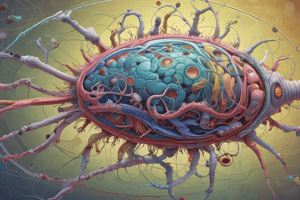Podcast
Questions and Answers
What is the primary function of nutrition in an organism?
What is the primary function of nutrition in an organism?
- To generate energy from glucose
- To respond to changes in the environment
- To remove waste products from the body
- To obtain and utilize energy and nutrients from the environment (correct)
Which of the following is NOT a part of the respiration process?
Which of the following is NOT a part of the respiration process?
- Breathing
- Ingestion (correct)
- Cellular respiration
- Assimilation
What is the purpose of excretion in an organism?
What is the purpose of excretion in an organism?
- To respond to changes in the environment
- To remove waste products from the body (correct)
- To obtain and utilize energy and nutrients
- To generate energy from glucose
Which life process involves the movement of materials within an organism?
Which life process involves the movement of materials within an organism?
What is the result of the growth and development process in an organism?
What is the result of the growth and development process in an organism?
Why are life processes essential for an organism?
Why are life processes essential for an organism?
What is the primary function of assimilation in nutrition?
What is the primary function of assimilation in nutrition?
Which of the following life processes involves the production of offspring?
Which of the following life processes involves the production of offspring?
Flashcards are hidden until you start studying
Study Notes
Definition of Life Process
- A life process is a series of activities that occur within a living organism to maintain its life and function.
- These processes are essential for the survival, growth, and reproduction of an organism.
Basic Life Processes
- Nutrition: The process by which an organism obtains and utilizes energy and nutrients from its environment.
- Ingestion: Taking in food and nutrients.
- Digestion: Breaking down complex molecules into simpler ones.
- Absorption: Taking in nutrients through the bloodstream or other bodily fluids.
- Assimilation: Converting absorbed nutrients into energy or building blocks for growth and repair.
- Respiration: The process by which an organism obtains energy from the breakdown of glucose and other organic molecules.
- Cellular respiration: The process of generating energy from glucose within cells.
- Breathing: The process of taking in oxygen and releasing carbon dioxide.
- Transportation: The process by which materials are moved within an organism.
- Circulation: The movement of blood throughout the body.
- Osmosis: The movement of water and solutes through cell membranes.
- Excretion: The process by which an organism removes waste products from its body.
- Kidney function: Filtering waste and excess substances from the blood.
- Sweating: Removing excess heat and waste products through the skin.
Other Life Processes
- Growth and Development: The process by which an organism increases in size and complexity.
- Reproduction: The process by which an organism produces offspring.
- Response to Stimuli: The process by which an organism reacts to changes in its environment.
- Movement: The process by which an organism changes its position or location.
Importance of Life Processes
- Life processes are essential for the survival and continuation of an organism.
- They allow an organism to adapt to its environment and respond to changes.
- They enable an organism to grow, reproduce, and maintain homeostasis.
Definition of Life Process
- Life processes are essential activities that occur within a living organism to maintain its life and function.
Basic Life Processes
Nutrition
- Ingestion: Food and nutrients are taken into the body.
- Digestion: Complex molecules are broken down into simpler ones.
- Absorption: Nutrients are taken in through the bloodstream or other bodily fluids.
- Assimilation: Absorbed nutrients are converted into energy or building blocks for growth and repair.
Respiration
- Cellular respiration: Energy is generated from glucose within cells.
- Breathing: Oxygen is taken in and carbon dioxide is released.
Transportation
- Circulation: Blood is moved throughout the body.
- Osmosis: Water and solutes are moved through cell membranes.
Excretion
- Kidney function: Waste and excess substances are filtered from the blood.
- Sweating: Excess heat and waste products are removed through the skin.
Other Life Processes
Growth and Development
- Organism increases in size and complexity.
Reproduction
- Organism produces offspring.
Response to Stimuli
- Organism reacts to changes in its environment.
Movement
- Organism changes its position or location.
Importance of Life Processes
- Life processes are essential for survival and continuation of an organism.
- They allow adaptation to environment and response to changes.
- They enable growth, reproduction, and maintenance of homeostasis.
Studying That Suits You
Use AI to generate personalized quizzes and flashcards to suit your learning preferences.




